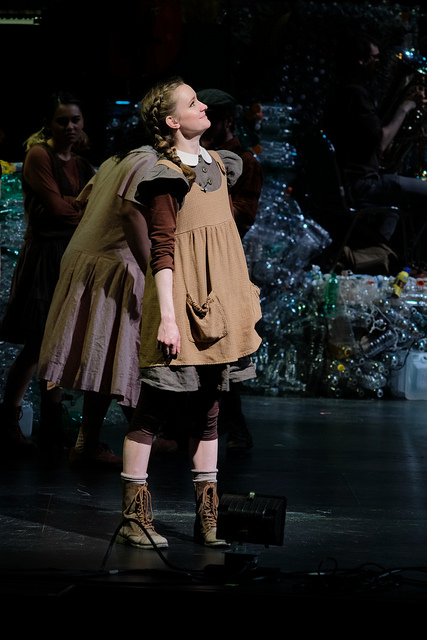
By AKDENIZ RYSMENDIEVA
Jenna Craig twiddles with her thumbs and lets out a long sigh as she ponders on a concept that haunts us all: the future. Craig is an 18 year-old SAG-AFTRA actress that has co-starred in major films alongside big names like Ryan Reynolds, and Blake Lively, but despite the seeming promise, she’s just as lost as the rest of us. Fittingly, she is a Theater student at Ramapo College (with an Acting concentration), but this may no longer be the case next semester.
“I found myself asking: what are you going to do if acting jobs just aren’t around? The fear was overwhelming.”
Students majoring in Theater like Craig constantly find themselves asking: Is it worth it? Theater majors pay a whopping $30,000 annually, for a major that (according to U.S. News) proves an average salary of $26,000 and an unemployment rate of 7.8 percent. With experience, however, majors can boost their salary to $45,000, but even then that’s barely considered a boost in the “real” world.
What’d the famous ones do?
Most A-List actors didn’t acquire their degree at all. Nicole Kidman didn’t even finish her high school career, instead pursuing acting jobs until she landed on Hollywood’s radar with her performance in “Dead Calm.” Similarly to Kidman, Emma Stone never completed her high school career either, instead convincing her parents to move to Hollywood so she could pursue acting full time.

As for those who attempted a college career, the majority of Hollywood’s successful actors dropped their studies to work a series of odd-jobs, before luckily landing a role that’d change their lives forever (i.e, Michael Fassbender, Tom Hanks, Halle Berry, etc.)
One of those who went directly into an arts career without getting a degree is actor, screenwriter, and director Nikole Beckwith, who spoke about her journey in an interview with The Atlantic.
Beckwith said, “being an actor in New York not having gone through some kind of program … it was so hard. It was impossible.” However, part of the reason she was able to keep trying was because she was not paying back massive loans. “I was able to audition and send things out and be writing and working.”
On the other hand is Political Science, and Drama Professor Ainura Arzymatova of The International University of Kyrgyzstan, who emphasizes the importance of acquiring an education.
“My advice is this: when it comes to studying acting, an education will only help you, but that does not mean it has to be Ivy League.”
Although she herself attended an Ivy League school (New York University) and acquired her Masters for the Arts there, she acknowledges that “of course, the tuition back then wasn’t as huge” because she had attended the University in 1974, “but you don’t always need a masters degree from such an expensive school.”
While reflecting on her own experience, Arzymatova says that “acting jobs definitely didn’t stick around for (her)” but thanks to the education she received “(she) is still surrounded by (theatre),” while also having the ability to “pay her bills.”
When it comes to successful actors that, like Arzymatova, completed their college careers, the majority didn’t study Theater, instead focusing on the more acceptable, money-making majors. It’s interesting to note that the majority are still inclined towards the Liberal Arts, with concentrations like English, Literature, and History coming up the most, according to a report done by Rasmussen College.
Stars like Natalie Portman and Tommy Lee Jones graduated with a BA in English at Harvard, while other big-names like Jodie Foster, John Lithgow, and Conan O’Brian opted for the Literature/History route.
Considering the fact that theater work involves so much creativity, it’s understandable that performers tend to fall back on majors revolving around the liberal arts, as theater work cultivates from current events, and the world’s experience in general. Of course, it’s also nice to use that interest to one’s advantage and have a “solid” degree so that a “solid” income can be acquired if the acting route doesn’t take off.
Ramapo College “theatre kids” speak
Speaking of Liberal Arts, our own Ramapo College is the epitome of a Liberal Arts School, and has been hailed the “hidden gem” of New Jersey. Despite the nickname, Ramapo College’s incoming freshmen amount has been rapidly increasing every year. Ramapo College’s Theater program in particular, has been ever-growing, going as far as making a list of Top Ten Most Underrated College Theatre Programs for 2017. A highlight noted by both interviewees (who are very involved in the Theatre Program) is the college’s fluidity when it comes to the students’ interests. More often than not, freshmen end up changing their majors the next year, either because they’re disinterested in the one they had prior, or they feel uneasy about the validity of the major in the real world. This is specifically evident with Theater majors, but thanks to Ramapo’s resources and subsequent flexibility, the art kids don’t have to necessarily ditch their dreams.
Ramapo College senior Amber Walker is a prime example of that sort of situation.

Walker is a 21-year old actress that has starred in several mainstages while at Ramapo. She’s portrayed classic, Shakespearean ladies like Lady Macbeth, and Viola, alongside complicated Greek muses like Electra, and most recently, Medea. The most interesting part is that she herself isn’t a theater major, and had she gone to a different school, would’ve never been given the chance to participate in the drama department.
“I came in being a Theater major with an Acting concentration, but of course reality hits and you start doubting yourself.”
Walker went on to talk about her transition from her original major, to the major she has now. “I’m a Contemporary Arts contract major, which is basically a way for me to draw from the courses offered, and develop a major that corresponds to my interests and goals.”
When asked about her decision-making, Walker said that there was definitely some “hesitation.”
“Graduating with a degree that doesn’t specify exactly what you’ve done is intimidating, but then I realized that the term ‘contemporary arts’ is vast in a good way, it allows for flexibility, and variety.”
Walker described her lengthy experience in the job-interview room working with casting agencies and other theater related duties.
“The contract major is definitely a conversation starter, and so far it’s served me well.”
After successfully acquiring internships for numerous casting agencies, Walker has quite the perspective when it comes to the entertainment industry’s inner workings, and she hopes the successful streak continues in the long-run.

On the other side of the age spectrum is Jenna Craig, a freshman at Ramapo that is seemingly following in Walker’s footsteps (but not entirely.) Considering she’s a very close friend of mine, I personally witnessed Craig’s period of existential questioning and doubt.
“I found myself asking: what are you going to do if acting jobs just aren’t around? The fear was overwhelming.”
And yet despite this brief crisis, she insists that acting is her passion, and she doesn’t plan on abandoning it.
“I’ve been acting since I was four, so it’s an integral aspect of my life… even if I don’t end up ‘making it’ I still want to commit to it.”
Similarly to Arzymatova’s attitude on the subject, Craig went on to say that “acting isn’t all about winning an Oscar.”
“It’d definitely be nice, but it’s truly about learning, and improving the craft.”
Next semester, Craig plans on sticking to her Acting concentration and joining Ramapo College’s Teacher Education program, so that this way she’ll have stability, a “Plan-B” without needing to surrender her love for the art.
“Acting evolves over time, and that’s why I love it so much. Being a part of that evolution would be a dream come true.”
Essentially, majoring in Theater indicates a desire to be a part of the entertainment industry, and industry that is brutally competitive. Becoming a “successful” actor (or making it “big”) relies heavily on luck, and actual skill comes second. This is proven by the research surrounding the rise-to-fame of certain A-Listers, as the majority were simply at the right place at the right time. Evident in the statements of Jenna Craig, and Professor Arzymatova, studying acting isn’t always about “making it big” in Hollywood. One should follow through with the degree because of a genuine love for the craft (which is relevant to any major), while accepting the fact that it won’t guarantee a star on the Hollywood Walk of Fame. All in all, whether or not someone pursues a theater major depends entirely on the person and what they plan to do with it – at the end of the day, it’s not nearly as bad an idea as our society likes to make it seem, but based on the general consensus, having something to fall back on wouldn’t hurt either. The circumstances are only better if the college in question allows for an exploration of different subjects, encouraging students to experiment and comprehend what it is exactly that they want.
More stories:
The most disproportionately popular college major in every US state
Theatre faces final curtain if new EU law approved
I learned that there are a lot of big names that have not achieved a full education. As a person who has taken theater arts classes and done school production I have considered acting but didn’t want to study it in college for fear it may not work out. Can you give me an exact statistic of those who have acting career without a degree? Is there any suggestions that you can give acting majors about back up plans?